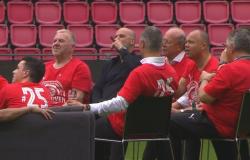UA professor of International Politics Tom Sauer responds to the Opinion of Belgian former diplomats Frans van Daele and Johan Verbeke in De Standaard of April 6, 2024. “There is a simple solution to prevent further losses, namely negotiation. This message is expected you also love our diplomats. Quod non.”
Former diplomats from Daele and Verbeke pat themselves on the back in an extensive interview in DS (6-7 April). “Like Putin, Europe must change the language of hard power speak,” and defense budgets must increase again.
Si vis pacem, para bellum. They warn that if Ukraine falls, it will be our turn. Katlijn Malfliet (DS, April 3) does not agree: if you want peace, prepare for peace. Elvis Peeters (DS, April 8) is even clearer: if you want peace, don’t go to war. I agree with the latter.
Instead of a sober analysis based on realpolitik that you can expect from former diplomats, it is an emotional discourse mainly based on principles. “We’re not going to let ourselves be done. Putin, you are not going to win this war.”
Only they do not say how we – read Ukraine – will win this war, or at least not lose it. It is insinuated that we need to supply more and better weapons, including the famous Taurus missiles. Always more weapons. As if that has worked in the past.
Do they really think that Russia will sit still in the meantime?
The strongest war economy is Russia’s and it doesn’t look like that will change. In terms of hard power Russia is a size too big for Ukraine: a three times larger population and therefore many more potential troops, a thirteen times larger economy, including many more raw materials for the defense industry.
Unfortunately, Kiev cannot win this attrition war. The 60 billion in aid from the US that was approved this weekend (April 20) is a boost, but not a game changer. And certainly not when we see that the Ukrainian army is at its wits’ end.
The average age of the Ukrainian army is 43 years. Young people do not want to go to the front. Who can blame them? If motivation at the beginning of the war kept Ukraine standing, today it is the other way around. So the picture does not look good at all for Ukraine. Ukraine is systematically losing ground.
However, there is a very simple solution to prevent further losses, namely negotiation. You also expect this message from our diplomats. Quod nun. Van Daele and Verbeke are in unison: “There’s no point in talking now because it’s a sign of weakness.”
Last summer, when Kiev was winning, they thought it could have been done. In any case, I did not hear that call for negotiations by Zelensky and the West at the time.
And if negotiating is called weakness today, how will they describe the situation if Russia takes over more and more territory? Russia’s negotiating position is growing stronger by the day; that of Ukraine weaker by the day. There is no question of a Western strategy at all.
Only if one were to believe – with the emphasis on believing – that the fortunes of war will turn in the future and that Russia can therefore be pushed back again (which, in the worst case, will trigger a nuclear reaction), does it make sense to hold back now.
But Verbeke himself admits at the end of the interview that, unlike Ukraine, the EU is not interested in recapturing the Donbas and Crimea.
In this case I have to agree with him, but then his proposed solution of waiting to negotiate makes even less sense. Talking is not a sign of weakness, as Koert Debeuf has previously made clear (DS, March 29).
Others argue that Putin does not wish to negotiate. However, I read in The New York Times that he has informally indicated several times since September that he was willing to agree to a ceasefire and diplomatic talks to reach a peace agreement.
The Kremlin repeated this a few days ago. Many, including our former diplomats, will not believe that. Putin is not shy about a white lie. I don’t deny that either. However, there is only one solution to find out if he means it: test it. Answer his question.
The problem is that Zelensky does not want to negotiate with Putin. He even put the latter into a decree. However, it will be with Putin that negotiations will have to take place. Israel is also negotiating with Hamas.
It may not work the first time. In that case, there is no other option to try again afterwards. Today people on the Western side do not want to try even once. Supposedly in the interest of Ukraine.
The fact is that in the current circumstances Ukraine is losing because of our non-policy. Every day, more soldiers and civilians are injured and killed, and Ukraine is losing ground. I fear that the surreal war situation that Michael Van Peel (DS, April 6-7) recently described has not yet reached our capitals.
It is Washington, Brussels, Berlin and Paris that ignored or even humiliated Russia after the Cold War, which helped lead to the war we know today. Of course, the greatest responsibility for the war lies with Putin.
I explain all this in detail in my newly revised book The Struggle for Peace. And how we can win it. Unfortunately, today we still don’t know what wood arrows are made from. The victim is always Ukraine.
And out of a sense of shame we send money and weapons, which benefits the (American) arms industry in particular, but not enough for Kiev to even be able to hold on.
At the same time, Zelensky is urged not to start negotiations. This is a non-policy. Our Western leaders, generals and diplomats should be even more ashamed.
This Opinion appeared in De Standaard on April 22, reproduced with permission from the author. Further acquisition by third parties after permission from Tom Sauer. Tom Sauer is Professor of International Politics at the University of Antwerp and author of The Struggle for Peace (Pelckmans, 3e edition, 2024)
Support for a new website
We need your help for an essential refresh of the website. We need 30,000 euros to make it more interactive, faster and user-friendly. Every contribution, big or small, helps. With your donation you support independent journalism that continues to report the stories that really matter. Let your heart speak.







